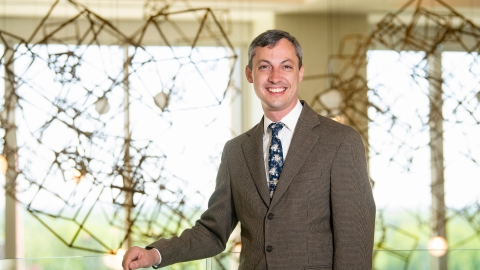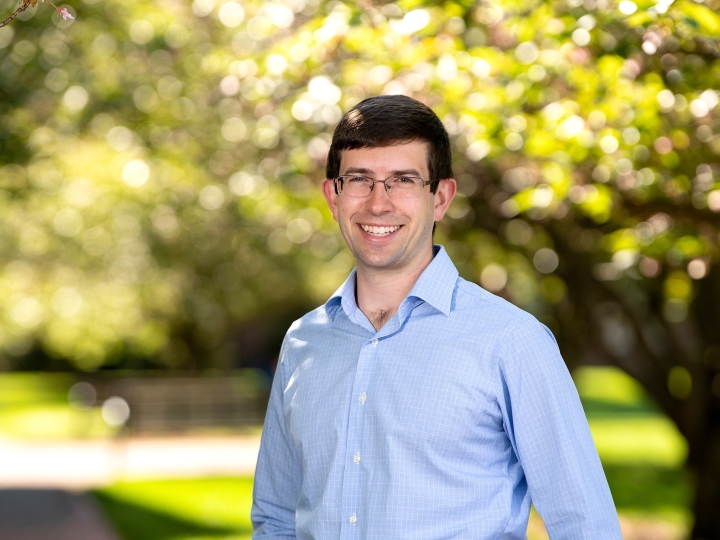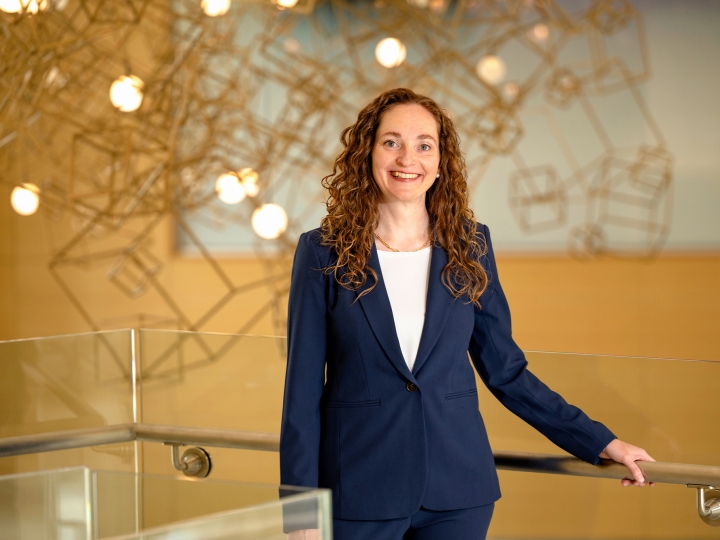
Daniel Street, Accounting & Financial Management
October 13, 2023
Professor Daniel Street, accounting & financial management, has examined how tools like ChatGPT impact workplaces. Photo by Emily Paine, Communications
"At Bucknell, I realized I could not only help students develop their skill sets, but I could also learn from them and the Bucknell alumni network to enhance my own research and better understand this field."
Whenever Siri answers a question, Google Maps calculates the best route to grandma's house or Amazon recommends a blender, that's artificial intelligence at work. But while AI has been powering technological tools like those for more than 20 years, the rise of AI-powered chatbots like ChatGPT has invited consumers to interact directly with artificial intelligence.
Professor Daniel Street, accounting & financial management, has been paying attention. Along with his Freeman College of Management colleagues, Street has been examining the implications of tools like ChatGPT and how they might forever change business, writing and what it means to be a productive employee.
Earlier this year, Street and Professor Joe Wilck, analytics & operations management, explored how accountants could harness ChatGPT. Together with Zach Chism, instructor of accounting at the Culverhouse School of Accountancy, the University of Alabama, they published an article in The CPA Journal that outlines suggested guidelines for using ChatGPT and other large language models (LLMs) in the practice of accounting.
When ChatGPT was released to the public in November 2022, it removed a barrier to interacting with AI. People could have a two-way conversation with an AI-powered tool and ask it to write a speech, proofread a college application essay or even create a home workout using only items from the pantry.
"ChatGPT is the result of programming, trained on hundreds of gigabytes of text from sources like Wikipedia," Street says. "Once you start writing a sentence, there are a finite number of words that can come next and a probability that each of them will occur. That's the intuition behind ChatGPT — predicting individual words and then stringing lots of those together to make the most likely sentence."
Unlocking Opportunity
Even with a sophisticated probability tool, Street says he wouldn't have predicted the string of events that led him to Bucknell. He got his undergraduate degree at Kennesaw State University in Georgia, entering as a management major but changing to accounting in his sophomore year, largely because of a professor who showed him that accounting can be thrilling and open new avenues.
"She showed me that accounting unlocked more opportunities than I could imagine," he says. Street continued into the master's program at Kennesaw, taking classes while simultaneously working full-time in Atlanta and completing a research assistantship to help offset the cost of his degree. After graduating, he took on a variety of analyst roles that engaged his intellect and talent for logic and reasoning. He went on to earn his doctorate from the University of Alabama, and when he neared the end of that program, Bucknell came onto his radar.
The University stood out for one primary reason: outcomes. Street saw Bucknell as a place where he could change lives both by teaching future financial experts and by advancing his own research.
"At Buckell, I realized I could not only help students develop their skill sets, but I could also learn from them and the Bucknell alumni network to enhance my own research and better understand this field."
While Street doesn't expect he'll be researching ChatGPT his entire career, he's enjoying the experience of contextualizing and analyzing the "it" tech tool of the moment. He considers questions like how accountants can use ChatGPT to help them do their job more efficiently, and whether AI will either assist or replace experts in the field.
"I recommend that accountants use ChatGPT to enhance their work across a variety of tasks, and certainly do not predict the death of accounting at the hands of these tools," he says. "Large language models like ChatGPT can't be relied upon as trustworthy specialists. They can't exercise the professional judgment required of a CPA, they struggle to tailor their responses to the particular institutional features and dynamics of a specific organization, and they're always going to be based on historical training data, so they will struggle to provide clients with innovative, future-oriented advice."
As for the expectations of professors, Street says many of his colleagues have developed language for their syllabuses outlining dos and don'ts of using ChatGPT when completing assignments. While some companies have banned ChatGPT, largely because of their understandable concerns over data privacy, Street doesn't prevent his students from using the technology to their advantage.
"I prefer to think of a large language model very much like a calculator," he says. "Could I require students in accounting to add things by hand? Yes. Is it going to produce higher quality output than a calculator? No. By exposing students to ChatGPT and similar tools, I'm hoping to hone their skills and train my students for the society that they will interact with over the course of their lives."
It's all part of the way Street prepares his students to make themselves as indispensable as possible: To put themselves in a position where AI can't replace them. Some workers might attempt to outrun the technology by continually improving their technical accounting skills.
"But trying to differentiate yourself merely by technical expertise is an arms race that has existed for a long time," Street says, "that's a hard, hard game to play."
Instead, Street recommends his students supplement their technical expertise with skills a large-language model can't learn. "ChatGPT can't decide where to allocate its time. It can't create a business," he says. "We could call that strategy, but I prefer to simply call it 'doing.' Humans have an incredible capacity for doing — we can be wise, creative, compassionate and take action!
"We built the wheel. We harnessed fire. We domesticated animals, cultivated crops, built industries, founded cities, developed computers and the internet," he says. "That is an incredible human history of doing. And I want my students to become doers."

